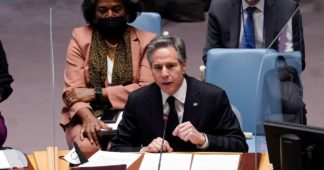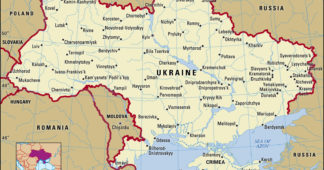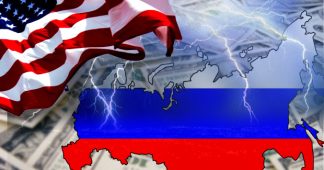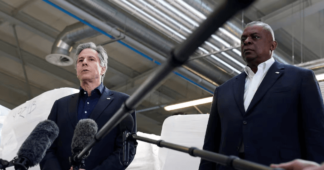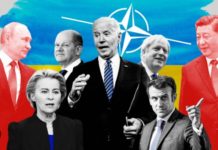The Secretary of State called for Washington to continue to put militarism before diplomacy
Posted on Categories
The US will focus its efforts on arming Ukraine and not attempting to bring the war to a negotiated settlement, America’s top diplomat said. Secretary of State Antony Blinken laid out a plan to massively expand Kiev’s military before talks begin.
In a speech delivered in Finland on Friday, Blinken stated, “The United States – together with our allies and partners – is firmly committed to supporting Ukraine’s defense today, tomorrow, for as long as it takes.” He continued, “We believe the prerequisite for meaningful diplomacy and real peace is a stronger Ukraine, capable of deterring and defending against any future aggression.”
Blinken dismissed the idea of even a temporary pause in the fighting. “Some countries will call for a ceasefire. And on the surface, that sounds sensible – attractive, even. After all, who doesn’t want warring parties to lay down their arms? Who doesn’t want the killing to stop?” He said. “But a ceasefire that simply freezes current lines in place and enables Putin to consolidate control over the territory he’s seized…It would legitimize Russia’s land grab. It would reward the aggressor and punish the victim.”
The Secretary of State offered an ambitious vision of Kiev’s future military capabilities. “America and our allies are helping meet Ukraine’s needs on the current battlefield while developing a force that can deter and defend against aggression for years to come.” He added, “That means helping build a Ukrainian military of the future, with long-term funding, a strong air force centered on modern combat aircraft, an integrated air and missile defense network, advanced tanks and armored vehicles, national capacity to produce ammunition, and the training and support to keep forces and equipment combat-ready.”
It is unclear how long it would take to build the deterrence force envisioned by Blinken. American arms stockpiles are dwindling as Washington attempts to transfer Kiev enough military equipment to keep its army fighting. The US additionally has plans to significantly increase arms transfers to Taiwan.
Blinken claimed, “Our support for Ukraine hasn’t weakened our capabilities to meet potential threats from China or anywhere else – it’s strengthened them.” In November, the Wall Street Journal reported, “US government and congressional officials fear the conflict in Ukraine is exacerbating a nearly $19 billion backlog of weapons bound for Taiwan, further delaying efforts to arm the island.”
Additionally, the White House may not have the support it needs in the Capitol for such a massive military buildup in Ukraine. Blinken asserted that “in America, this support is bipartisan.” However, at the beginning of May, Rep. Michael McCaul (R-TX), chairman of the House Foreign Affairs Committee, said future support for Ukraine would be contingent on success in Kiev’s long-planned counteroffensive.
Since McCaul’s statement, Ukraine has slowly lost more territory to Russian forces, including Bakhmut. Zelensky committed endless resources to the city in a months-long battle despite the advice from his Western backers. The White House is now preparing for the counteroffensive to fail.
Washington’s strategy, as laid out by Blinken, calls for arming Ukraine and weakening Russia. “Russia is significantly worse off today than it was before its full-scale invasion of Ukraine – militarily, economically, geopolitically,” he stated, adding, “President Putin has diminished Russian influence on every continent.”
However, Gen. Christopher Cavoli, the commander of US European Command, told Congress in April that Moscow’s ground forces are “bigger today” than before Moscow launched its invasion of Ukraine last year.
While the White House has attempted to isolate the Kremlin, Moscow has weathered Western sanctions by developing relationships in the global south. On Friday, Russian officials met with prospective members of the BRICS coalition, including Saudi Arabia, Iran and the UAE. In September, Iran’s President Ebrahim Raisi said in a meeting with Putin, “The relationship between countries that are sanctioned by the US, such as Iran, Russia or other countries, can overcome many problems and issues and make them stronger.”
Blinken justified the Biden administration’s commitment to a militaristic approach by claiming the White House attempted to engage the Kremlin in meaningful diplomacy before the invasion of Ukraine. “President Biden told President Putin that we were prepared to discuss our mutual security concerns – a message that I reaffirmed repeatedly – including in person, with Foreign Minister Lavrov.” The Secretary of State continued, “We offered written proposals to reduce tensions. Together with our allies and partners, we used every forum to try to prevent war, from the NATO-Russia Council to the OSCE, from the UN to our direct channels.”
In April 2022, Biden administration official Derek Chollet admitted that the White House refused to negotiate with the Kremin on Putin’s core concern, Ukraine becoming a member of NATO. “We made clear to the Russians that we were willing to talk to them on issues that we thought were genuine concerns,” Chollet said, adding that the administration didn’t think that “the future of Ukraine” was one of those issues and that its potential NATO membership was a “non-issue.”
* Kyle Anzalone is the opinion editor of Antiwar.com, news editor of the Libertarian Institute, and co-host of Conflicts of Interest.
We remind our readers that publication of articles on our site does not mean that we agree with what is written. Our policy is to publish anything which we consider of interest, so as to assist our readers in forming their opinions. Sometimes we even publish articles with which we totally disagree, since we believe it is important for our readers to be informed on as wide a spectrum of views as possible.
